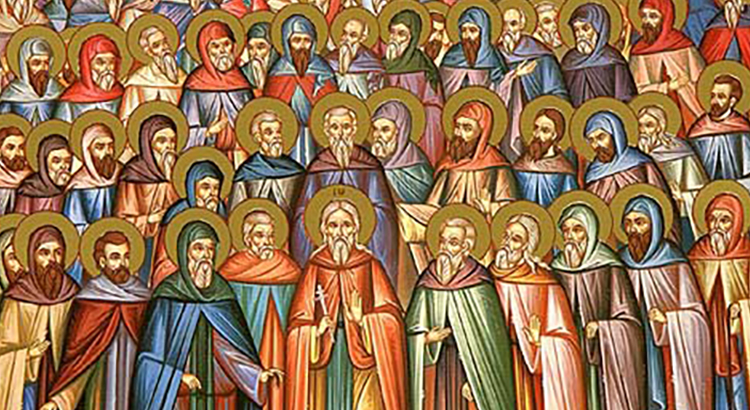Memory of the Saints and the Prophets
Reading of the Word of God
Alleluia, alleluia, alleluia
You are a chosen race,
a royal priesthood, a holy nation,
a people acquired by God
to proclaim his marvellous works.
Alleluia, alleluia, alleluia
Jeremiah 31,1-7
When that time comes, Yahweh declares, I shall be the God of all the families of Israel, and they will be my people. Yahweh says this: They have found pardon in the desert, those who have survived the sword. Israel is marching to his rest. Yahweh has appeared to me from afar; I have loved you with an everlasting love and so I still maintain my faithful love for you. I shall build you once more, yes, you will be rebuilt, Virgin of Israel! Once more in your best attire, and with your tambourines, you will go out dancing gaily. Once more you will plant vineyards on the mountains of Samaria (those who plant will themselves enjoy the fruit). Yes, a day will come when the watchmen shout on the mountains of Ephraim, 'Up! Let us go up to Zion, to Yahweh our God!' For Yahweh says this: Shout with joy for Jacob! Hail the chief of nations! Proclaim! Praise! Shout, 'Yahweh has saved his people, the remnant of Israel!'
Alleluia, alleluia, alleluia
You will be holy,
because I am holy, thus says the Lord.
Alleluia, alleluia, alleluia
The language of love is the most suitable to express the relationship of the Lord with his people: "I have loved you with an everlasting love; therefore I have continued my faithfulness to you. Again I will build you, and you shall be built, O virgin Israel!" God's love for Israel is "everlasting." God's love for Israel is eternal and lasting; it is faithful no matter what may happen. We can locate the beginning of God's love in Exodus when God, after freeing his people from bondage in Egypt, made a strong alliance between himself and his people in the desert. The desert was witness to the affection with which God, the bridegroom, took care of his bride. There, Israel learned to love the Lord, and the Lord sealed a pact of fidelity with his people based on his "everlasting love" (v. 3). Even the prophet Hosea takes the spousal imagery and refers to God as the one who desires to restore his love for Israel as it was before and chooses the place where this love may gush forth: "Therefore, I will now persuade her, and bring her into the wilderness, and speak tenderly to her" (Hos 2:16). The desert is not a mystical place, but a place where love is built with tenacity and dedication, where the believer is aware of the power of passion and the need for fidelity to the Lord and to his covenant. The desert becomes a path of hope that leads to "grace in the wilderness" (v. 2). Today what is similar to the desert if not our cities, often devoid of life and love? And in this contemporary desert believers should rediscover and revive the covenant with God. Here, in the heart of our cities, is the crucible of love and passion for a new city that may be a place of serenity and peace for all. The path that leads from the desert to Jerusalem is not about a different space unrelated to our daily lives. That path is within our very own cities and societies. We are called to transform our cities that so often resemble a desert, inhabited by violence and solitude, into a place of love and peace. In this way our cities start to become similar to Jerusalem as a "place of peace" where the Lord lives, that holy mountain that shines forth with light that lights the world. It is a path that ascends, leading us away from egocentrism that continues to pull us down. The prophet shows us the way leading from the desert-city to a peace-city, where the drought has disappeared and life is abundant, where both the young and the elderly dance in joy. This is the prophecy for the Community of believers gathered before the Lord and participating in his plan of love for the whole world. This prophecy includes the poor and the sick, "the blind and the lame" (v. 8), women and children, and all those attracted by the Gospel of friendship and celebration. No one is left out. The Lord says: "I have become a father to Israel, and Ephraim is my firstborn" (v. 9).
